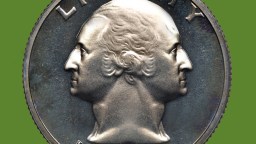“Money, it’s a gas,” wrote Pink Floyd’s Roger Waters for their hit ‘Money’. Author, speaker, and social innovator Vicki Robin would probably agree: she posits that most people don’t understand the true, human, working value of money. Because when she breaks it down like she does here in this video, you might be tempted to reevaluate your own spending habits. Vicki’s latest book is Your Money or Your Life: 9 Steps to Transforming Your Relationship with Money and Achieving Financial Independence.
Vicki Robin: We all know: it’s like everything from “Money is status,” “Money is power,” “Money is sex appeal.”
I just read that “The more beautiful the woman the bigger the diamond and the uglier the man who gave it to her,” you know, so it’s—why is that? That has nothing to do with the daily transactions! That is something emotional. That’s how the man believes he’s going to feel with a beautiful wife, how the woman feels when she’s got an expensive rock on her hand. These are all feelings, they’re status, like, “I made it,” proving yourself to your third-grade teacher or your nemesis in high school or your parents.
There’s so many ways in which we project onto money the ability to not only make us happy but to make us “better” or better than other people or safe, or—so many deep gut level emotional feelings are playing themselves out in our relationship with money. And, you know, fine. I’m not saying it shouldn’t happen. “We will all be very conscious and we will not have any emotions in our relationship with money.” I’m not saying that. I’m just saying the more aware you are of what you’re projecting onto money in terms of meeting emotional and psychological and even spiritual needs the clearer you’re going to be in those daily transactions. In fact that’s part of why once you start to become conscious of money and stuff in your life this way, you stop spending so much money.
But around that is another level: there is the cultural narrative, the rules of the game of our economy, of the financial system which in so many ways governs not just our daily lives but who wins and who loses, who has power and who does not have power, who gets to say what the game is, who gets to play by the rules and break the rules. I mean this is a cultural context. It has nothing to do particularly with what’s going on in our individual traumas and histories, it has to do with a longer historical moment in time, and the basic meme of the financial system is growth.
I mean it’s really—in a way it’s sort of a very long-con Ponzi scheme, because it has to keep growing in order to keep meeting its obligations. Money is produced—I mean the actual pieces of paper and metal, the credit that you have isn’t just like you go to a job and somebody gives you some pieces of paper, it’s—money is loaned into being by banks. Banks have the authorization to create money but it’s not like they have to have $1,000 in the vault in order to lend you $1,000. No, they have to have $100 in the vault to lend you $1,000, and then they lend you the $1,000 with interest. So in the world of money everything has to grow. Everything has to keep growing or it’s Game Over, which is a difficulty for us now because of the capacity of the planet to support this ideology.
So that’s that construct of money, which is fascinating. People study economics and financial systems were mesmerized by how people have played this system to the detriment of many people except for themselves. And then but what we say is that outside of that whole thing, those are all stories.
What we actually know for sure as individual human beings we know that we have a body, that we know that we’re alive, and that we invest some of the minutes of our lives, some of the vital force of our lives in a process that produces money for us. However it produces it, whether it’s a job, whether it’s investments, whether it’s dog sitting, whatever it is whether it’s stealing the Topkapi diamond.
It’s like whatever it is, we invest some of our precious life energy in this thing called getting money. So money for us is your life energy. The value of money to you is how much of “you” you invested in getting it. And once you understand that, once you understand that money is something that’s abstract and seems unlimited, like, “if I go into debt it doesn’t matter, I’ll just keep having jobs and I’ll keep paying it off.” I mean it’s just an endless sort of stumbling process. But you understand that your life is limited, you know. We’ve got—I’m going to say 85 years on the planet because now I’m 73 so I don’t say 75 anymore.
So we’ve got a certain limited time on the planet. We’re going to spend a third of it sleeping. We’re going to spend another third of it commuting and showering and sitting at a desk and doing somebody else’s bidding. That’s not a lot of life.
So you think, I’ve got a third, I have a third of my waking hours, are mine to do whatever I want.
Who am I? So it’s like it then sends it into an existential question. Who am I? What do I care about? What do I want my little dent in time or scratch in eternity to be? What do I want the impact of my actions to be? What do I want to learn? What do I want to understand? What do I want to feel, taste, touch? What do I want, in what Mary Oliver calls “my one wild and precious life”?
So that once you do that tip and then you go like okay, so what am I earning?
I’m earning let’s say $36 an hour. And I’m not going to do the whole shaggy dog story of like you’ve got to add onto that hour the extra time you spend getting trained and commuting, and the vacation where the first three days of your vacation where you’re inert and you’re just staring. That’s all time associated with that hour. The commute expense and the training and you’re a consultant and you think you make a lot of money but you spend hours and hours to get the business for that one hour of time.
On average I will say—just run the experiment in your own life—that $36 for an hour will whittle down to about a quarter of that. So call that $9. Now we have a figure. An hour of my life is worth $9.
That’s interesting. Okay, you’re going out for coffee and a muffin? That’s an hour. So then you have to ask value questions around that, like, “Am I really glad that I spent an hour of my one wild and precious life on this coffee and muffin?” How do I actually even engage with that question? The way we suggest you engage with it is this: Did it make me happy commensurate with the value that I convey, I put on this one hour of my life?
“Yes! You know, like without that coffee and muffin every day my life would be like, you know, sort of at a 50 rather than at a 90.”
Is it in alignment with my values, with what I say is important? And what I think my purpose in life is?
And these are not easy questions to ask but you might as well ask it when you’re buying your coffee and muffin. When else are you going to ask it?! To what am I dedicating this, my existence?
And somehow or another you sort of get a vague sense purchase by purchase. It’s really the most amazing meditation on how do I invest my life to create the maximal value for myself and other people in the world?





